Varavara Rao: A Life in Poetry, a volume of Telugu poetry in English translation has come out from Vintage – Penguin Random House India, after three years of waiting. Even as it is three years since the interaction with the publishers began, my dream and efforts of bringing out this volume go back to three decades or more…
For decades I have been dreaming of seeing the qualitatively remarkable and fantastic Telugu revolutionary literature, or at least important writings, in other languages, more so in English, a bridge and window to all languages. Varavara Rao’s English poetry volume is a part of those dreams.
The attempts to take Telugu revolutionary literature into other languages began in the early phase itself, but even before they reached non-Telugu readers, the Emergency was imposed in the country with stringent restrictions on freedom of expression. Later, during the post-Emergency democratic upsurge, there was widespread interest all over the country about the revolutionary movement in Telugu land and more so about Jagityal – Siricilla peasant struggles. This interest, coupled with exchanges with revolutionary and progressive sections of other states, Telugu revolutionary literature began to be translated into English and Indian languages. CV Subba Rao (Sura) who joined in a Delhi college as a lecturer after the Emergency provided inspiring leadership in PUCL&DR and later in PUDR and began networking between Telugu, English and Indian languages as well as poets, writers and civil liberties activists of various states. He started translating and added his hand to KVR, who was already rendering Telugu works into English.
Then, two volumes of translated poetry, ‘Raktabeej’ in Hindi and ‘Dissenting Voices’ in English were published with the initiative of Subba Rao, perhaps with the help from Sumanta Bannerjee, Manoranjan Mohanty, Amarjit Chandan, Chaman Lal and Sudesh Vaid. These two slim volumes basically carried the protest poetry that blossomed in jails during the Emergency and they also included Telugu revolutionary poems along with VV’s.
In the next couple of years, Vegunta Mohan Prasad brought out ‘This Tense Time’, a huge volume of translations of Telugu poetry, rendered by himself and others. The canvas of this volume was 1915 to 1980 and thus it carried the revolutionary poetry of the first decades. Almost at the same time, John Oliver Perry edited ‘Voices of Emergency’, compilation of all India protest poetry of 1975-77 period and included some Telugu revolutionary poems. However, all these efforts comprised only a small part of Telugu revolutionary poetry.
The first solo volume of Telugu revolutionary poetry in English was that of Cherabandaraju, published at the first conference of All India League for Revolutionary Culture (AILRC) in Delhi in October 1983. Some of Cherabandaraju’s poems were selected, translated and published as ‘Sword Song’ with an introduction by Subba Rao. At the same conference, Sri Sri’s translations, ‘New Frontiers’ also came out, but it carried not only poetry from revolutionary phase, but also earlier phases.
The formation of AILRC and the visits of leaders of Revolutionary Writers’ Association to other states necessitated more translations and new translators like JC (Jaganmohanachari) and K Balagopal arrived. Thus by the 1980s, there were at least a half a dozen translators introducing Telugu revolutionary literature to non-Telugu, English readership. In the next three decades, a number of poems, short stories, a couple of novels and a few essays have been rendered into English.
This is the historical context of the translations of Varavara Rao’s poetry. Transaltions by KVR and CV Subba Rao, later by JC and Balagopal, all added up. Thus, by the early 1990s, there were translations of more than twenty poems. Then I thought of translating another twenty, thirty to bring out a volume and my efforts began during 1992-95 when I was working with the Institute of Social Economic Change. My first access with computer and printer there, and relatively free time when not in the field work, helped me carry out the translations. I began composing my first translations in the archaic software called Word Perfect and used to take printouts on Inkjet printer (MS Word and Laser printer were in the unimaginable future then!).
Thus I could make a volume of about 30,40 poems and we were so innocent at the time that we did not know a bit about English book publication world. We were already in Telugu printing and publishing field for more than two decades but were not aware of intricacies of English publication industry, monopoly of publication houses and the formidable obstacles of English book market. Just like in Telugu publication, we thought we were ready if we collected all the poems and began searching for a good cover page. We approached Ralli Jacob, a friend in AILRC from Bombay to help us out and he suggested sketches for each of the poems. He contacted Rafeeq Ilias, famous photographer, designer and film maker and the Bombay friends polished the translations, drew sketches for some poems and designed the book. Thus the work on ‘Muse Enchained – Some Prison Poems and Certain Other Poems’ began in January 1994 and went on for two years but somehow could not see the light of the day.
There was another attempt to bring out Varavara Rao’s poetry collection in English during the international seminar on nationality question held by All India Peoples’ Resistance Forum in Delhi in 1996. Yalavarti Naveen Babu took up the work in earnest with the help of friends like Ramana, Kanchan Kumar and Panduranga Raju. However, even this effort did not fructify. Ten years later, when Varavara Rao was one of the emissaries at the talks between the government and the revolutionary movement in 2004, there was another attempt for the book, but in vain.
At this juncture, one needs to remember and pay tributes to departed friends Ralli, Naveen Babu and Panduranga Raju, who took part in all these publication efforts and CV Subba Rao, KVR, K Balagopal, V Mohan Prasad and JC, who translated some poems.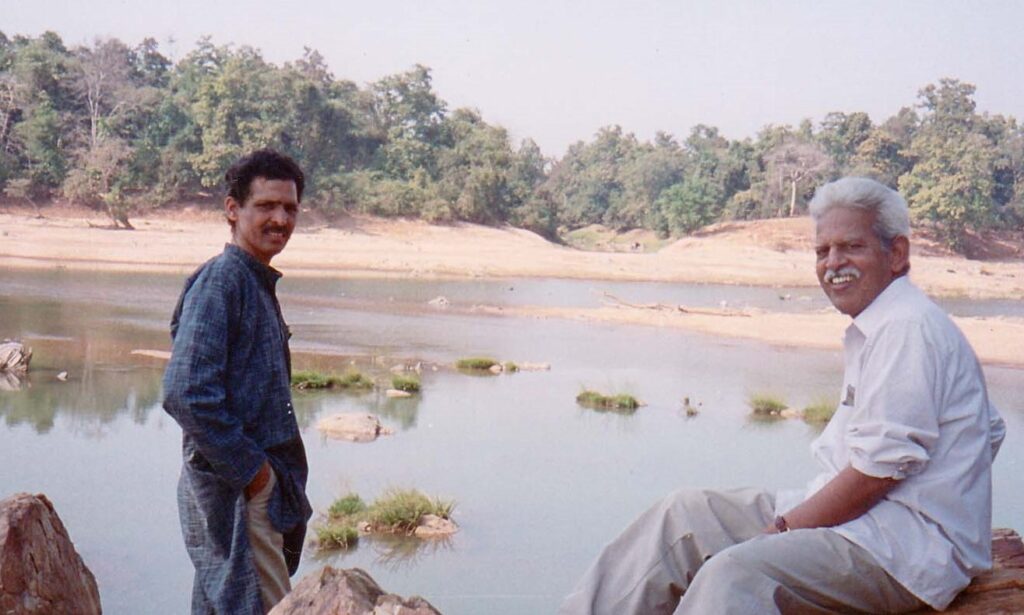
The letters Varavara Rao wrote from prison during 1988-89 were published in Andhra Prabha daily in Telugu and translations in Indian Express simultaneously. While the Telugu version ‘Sahacharulu’ came in a book form in 1990, the English rendering was published by Penguin in 2010 as ‘Captive Imagination’. With the response this volume received, again the idea of bringing out a translation volume of poetry revived. The idea got strengthened after Varavara Rao was arrested as an accused in Bhima Koregaon case in 2018. With the widespread protest, both in the country and abroad, against his arrest and particularly after the grave threat to his life in July 2020, his poetry was translated into at least 40 languages afresh. A website carried a continuous recitation of his poems in all languages for twenty four hours.
As part of that campaign, Meena Kandasamy, Nitasha Kaul and Apoorvanand recited my translation of Varavara Rao’s ‘Afraid of Earth’ and the video rendering became very popular. Consequently, Meena Kandasamy suggested that she and I make a proposal to Penguin for a translation volume of Varavara Rao’s poems.
Then, both of us began collecting all the hitherto translated poems and we brought together 20 poems translated by KVR, CV Subba Rao, JC, K Balagopal, V Mohan Prasad, D Venkat Rao and K Damodar Rao, from various journals and compilations. I took up translating about 60 poems Varavara Rao wanted to be rendered into English. Meanwhile Rohith translated a couple of poems. Taking into consideration their representative character, accessibility to non-Telugu readers and expression, we filtered all the translations and submitted a volume of 65 poems to Penguin. A contract was signed in September 2020 and Penguin made an announcement on October 9. Then the processing of editing began. Each and every poem was again and again scrutinised based on complex technical, aesthetic and legal parameters and finally this volume of 48 poems was finalised. Several inevitable and necessary processes in English publication field like reading proofs at least three four times, reviewing the translations at various levels, writing annotations and notes, discussions on poems and design and title page took months together and finally after two years and a half the book is out. The book consists of each one translations of JC, K Damodar Rao and Meena Kandasamy, each four of K Balagopal and D Venkat Rao, three of KVR, seven of Rohith and twenty seven of mine. It also carries a wonderful introduction assessing Varavara Rao’s personality and poetry by Meena Kandasamy.
For me it is a dream that has come true after thirty years. It is a historic occasion for Telugu revolutionary poetry in particular and Telugu literature in general.
*

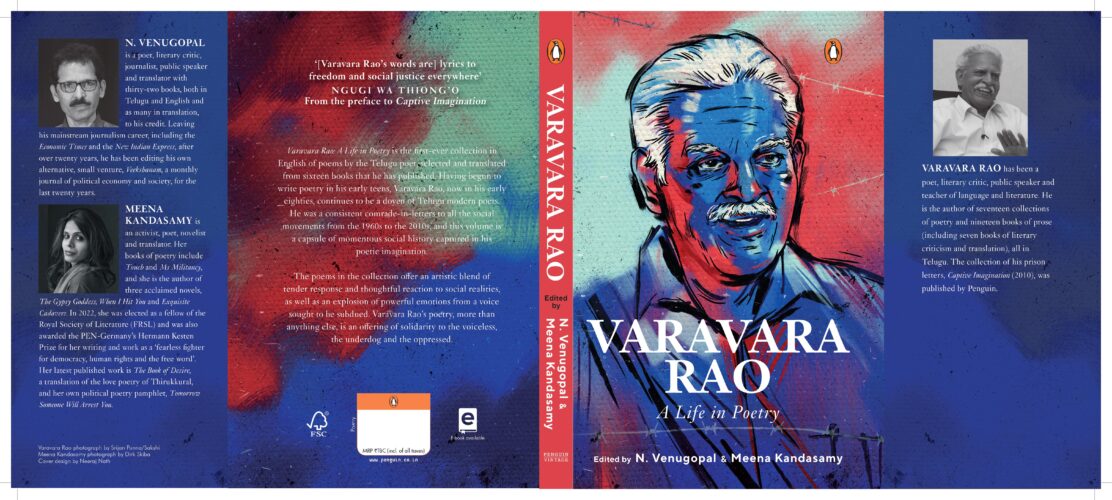


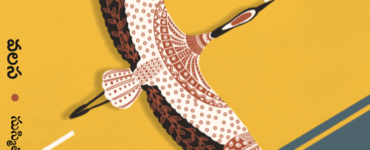

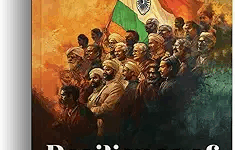
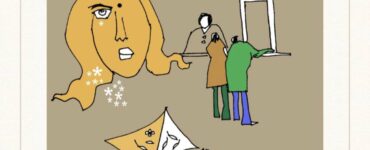

This also appeared in The Hindu sometime back. Good article on Varavara Rao garu